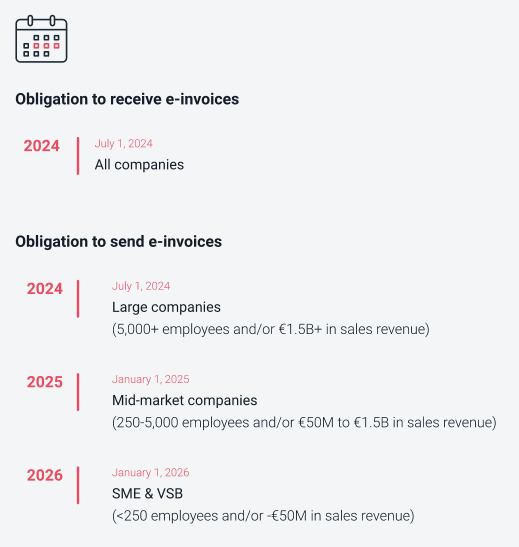Mandatory e-invoicing
for all B2B transactions
The Spanish Law 18/2022, better known as the “Crea y Crece" Law (Business Creation and Growth Law) was approved on September 28, 2022, to boost business development and promote entrepreneurship in the country through a series of regulatory and procedural developments. One of the reform's key measures is to require all business owners and professionals to issue, send and receive electronic invoices. This will help simplify the billing process and reduce the time and resources required for manual processing.
The Crea y Crece Law has four main objectives:
- Fight against commercial delinquency & prevent payment delays
- Facilitate the creation of companies
- Promote new business financing instruments
- Simplify the legal procedures

Implementation schedule
This e-invoicing requirement for B2B transactions will take effect gradually, based on company size, within a year after the final Law and regulatory update has been published (expected in 2023 or early 2024). As of January 2025, all business owners and companies with annual sales exceeding 8 million euros must be able to issue, send and receive e-invoices.

Technical requirements for mandatory e-invoicing
Pending the publication of the regulatory update, the draft of the technical regulation establishes the following requirements:
- Obligation to send and receive electronic invoices with other businesses
- Provide information on the status and payment of invoices
- Maintain access to e-invoices for four years for recipients. When the recipients are no longer customers of the issuing companies, access must be allowed for three years after contract termination.
These changes in 2025 mean that Spanish companies will no longer be able to send PDF invoices to bill their domestic B2B customers but will need to communicate via public or certified private e-invoicing systems. For the first year of the mandate, e-invoices must be accompanied by a readable version of the invoice in a PDF format so that they can be read by companies and professionals that do not yet invoice electronically.
The Law’s technical specifications will be developed around the following concepts:
Payment-related invoice requirements & information
E-invoices will have an approved structured format (EDIFACT, UBL, CII, etc.) and integrity and authenticity will be guaranteed by advanced electronic signature. The recipient of the invoice must provide information to the counterparty and to the public e-invoicing system to prevent payment delays.
Free interconnection & interoperability
E-invoicing providers must ensure free interconnection and interoperability between all parties and recipients cannot force the invoice issuer to use a solution. The procedure for accrediting interconnection and interoperability will be determined by regulations.
Preparing your company
for B2B e-invoicing
The Crea y Crece Law will bring a radical change to all companies. As the country awaits final details on the regulation, the timing is right to get started now; Don’t get caught playing catch-up. Here are some helpful tips you can already get started on to ensure that your company is ready for 2024, and beyond!
Anticipate the impact on your IT systems
Safely use mandatory invoicing data in all transactions (national and international B2B, B2G and B2C, including VAT declarations) and when choosing your platform for sending and receiving invoices.
Maintain good relationships
Closely monitor and maintain relationships with the tax authorities, your customers (who expect you to be in compliance in order to pay you), and your suppliers (who will know that you have received the invoice and expect you to pay on time).
Avoid bottlenecks
Get informed and make sure you are up to speed on the latest reform updates and existing solutions! Don’t put it off until the Law is enacted or until technology suppliers become inundated with requests. Anticipate solution implementation and user training, and carefully coordinate your project internally.
Centralise information on one platform
The easiest way to get ready for 2025 is from one single environment. Regulations, technology, and needs evolve. Manage all your e-invoicing transactions, current or future, B2B, B2G or B2C, national or international, from a single platform.
Avoid penalties
Failure to comply with e-invoicing measures can lead to a fine of up to €10,000. Public service companies and others with high invoicing will be penalised if they do not comply with the obligations described in Article 2.1 of Spanish Law 56/2007 on Measures to Promote the Information Society.
Why Esker
- Key player in the Spanish invoicing market and present internationally through 15 subsidiaries
- Global leader in automated source-to-pay and order-to-cash solutions, helping companies digitise their invoice processing, both inbound and outbound
- 39 years of experience with 20+ years focused on cloud solutions
- Global compliance in over 60 countries
- Single portal for all processes that complies with national and international regulations including current and future regulatory updates.
- Platform ISO 27001 certification (required to become a certified e-invoicing system in Spain)
- Active member of the Consortium of Technology Companies (CONETIC) as well as other working groups on Spanish regulations
- Participates in working groups that follow current affairs and influence the Spanish Ministry of Economic Affairs and Digital Transformation to facilitate the transition for its customers
- Active member of international and European forums on e-invoicing regulations (EESPA, PEPPOL, etc.)
- Solutions connected to different government platforms (FACe for B2B and B2G transactions, Chorus Pro in France, SDI in Italy, etc.), private portals (Ariba, Coupa, etc.) and interoperability networks including PEPPOL
- Solutions that comply with AS2 and AS4 specifications and operate with advanced electronic signature

Our partners
- Coming Soon
